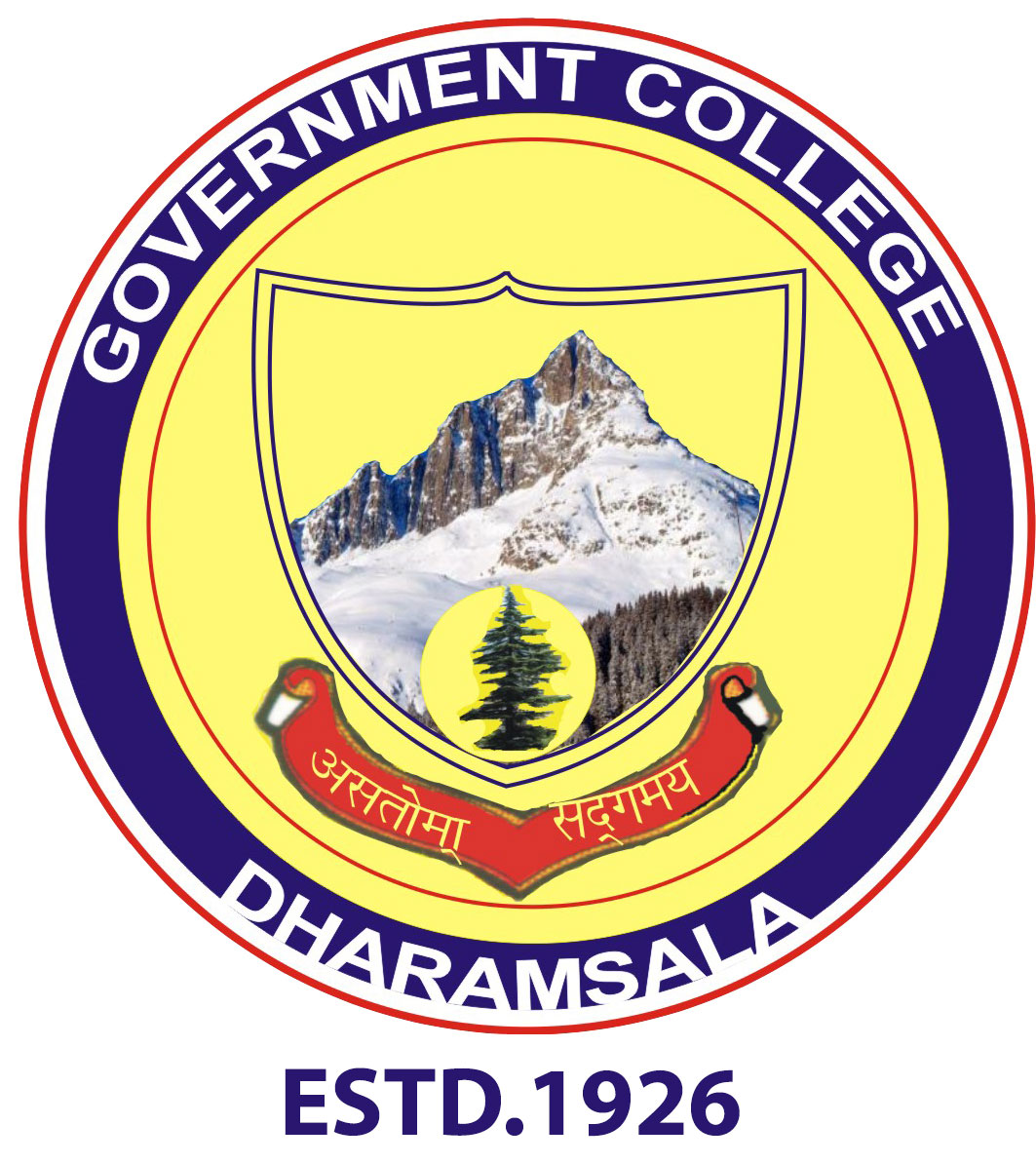UNDER GRADUATE
CHOICE BASED CREDIT SYSTEM (CBCS)
For B.A. I / B.Sc. I / B.Com. I
The CBCS:
Eligibility for Admission:
Courses in Programmes:
1. COMPULSORY COURSES:
(a) Languages-
2. Compulsory Hindi
(b) Social Science/ Commerce –
2. Compulsory Geography of Himachal Pradesh
3. Compulsory Indian constitution
4. Compulsory Himachal Past, Present and Future.
(c) Science –
2. Climate Change and its impact on mountain sustainability
3. Compulsory Environmental Science (Audit Pass Course)
(d) Skill Based Courses-
2. Functional Hindi
3. Application Packages for finance
4. Secretarial practice
5. Short Hand and Word Processing
6. Web Applications A
7. Office Computing
- a student majoring in language will NOT do Compulsory course in that language.
- a student majoring in a particular social science will NOT do Compulsory course in that
- a student majoring in science subjects will NOT do Compulsory Basic Science subjects.
A minimum of three compulsory courses (3 x 3 = 9 credits) will have to be done by each UG student to qualify for the UG degree.
2. MAJOR SUBJECT (CORE) COURSES
Hard Core Courses, which have to be done without exception. There will be no choice available.
Soft Core Courses, in which some degree of choice is available in the sense that he / she has to select a certain number of courses out of the given number (larger than the required ) of courses.
- ln each subject there will be a minimum of fourteen (14) core courses (hard and/ or soft). Each core course will be of four credit hours. Thus, a student majoring in the concerned subject will accumulate 14 x 4 = 56 credit hours by passing core courses.
- A student will be required to pass in a minimum of 14 core courses in the subject of his / her major to qualify for a UG degree in a subject (Major).
3. ELECTIVE COURSES:
a) However, a student may take more elective courses for the purpose of ‘Emphasis’ or ‘Double Major’.
b) Elective courses are to be from a student’s major / minor subject(s) as detailed above in the subject combinations allowed.
c) Each UG student will have to pass at least 10 to 13 elective courses from his/her in minor (allied) subjects being taught in the college.
d) Provided that each student will have to take a minimum of 5 elective courses in either of his /her minor subjects.
e) Each elective course will be 4 credit hours. Thus, a student will be able to accumulate at least 10 x 4 = 40 credits by passing elective courses.
4. GENERAL INTEREST AND HOBBY ( GI & COURSES
PROGRAMMES:
1. B.A. (Arts / Humanities/ Languages)
ii) Social Science / Humanities Group : Economics, Political Science, History, Geography, Mathematics, Sociology, Psychology, Physical Education, Public Administration, Music (Vocal or Instrumental), Fine Arts or Commercial Arts, Journalism and Mass Communication, Education, Sculpture, Tourism & Travel and Philosophy.
2. B.Sc. (Sciences / Physical Sciences/ Bio-Sciences)
3. B.Com. (Commerce / Management)
The programmes and subject combinations in Sciences and Commerce are as follows
- Mathematics
- Chemistry or one of the Social Science Subjects (Psychology, Economics, Geography) .
-
- Physics or Botany
- Maths or Zoology or one of the Social Science Subjects (Psychology, Economics, Geography).
-
- Zoology
- Chemistry or one of the Social Science subjects (Music, Fine Arts, Commercial Arts, Physical Education, Psychology, Geography).
-
- Botany.
- Chemistry or one of the Social Science subjects (Music, Fine Arts, Commercial Arts, Phy. Education, Psychology, Geography)
-
- Chemistry
- Botany or Zoology or Physics or Math or one of the Social Science subjects (Music, Fine Arts/Commercial Arts, Phy. Education, Psychology, Geography).
-
- One of the Social Science/ Humanities subjects.
- Maths or Geology or one of the Social Science subjects (History or Pol. Science).
-
- Physics or Economics or Computer Applications
- Chemistry or one of the Social Science subjects (Commercial Arts or Fine Arts or Psychology or Geography).
-
- Computer Science
- Physics or Chemistry or Geology or one of the Social Science (Journalism and Mass Communication or Geography or Commercial Arts or Fine Arts).
-
- Management
- One of the Social Science subjects (Maths or Physical Education or Journalism and Mass Communication or Fine Arts or Commercial Arts or Music)
List of Subjects Combination in Social Science/ Humanities
Pol. Science., Maths, Geography, History, Sociology, Public Administration, Compulsory English-ENG CE101, Compulsary Hindi-HINDI 101,Writing Skills-ENG AECC 104
English, Economics, History, Geography, Sociology, Hindi, Education, Journalism and Mass Communication (JMC), Compulsory English-ENG CE101, Compulsary Hindi-HINDI 101,Writing Skills-ENG AECC 104
Pol. Science., Geography, History, Psychology, JMC, Tourism and Travel ,Compulsory English-ENG CE101, Compulsary Hindi-HINDI 101,Writing Skills-ENG AECC 104
Pol. Science., Geography, History, Sociology, JMC, Music(I),Music(V), Painting, Compulsory English-ENG CE101, Compulsary Hindi-HINDI 101,Writing Skills-ENG AECC 104
Pol. Science, Geography, Sociology, Public Administration, Education, Compulsory English-ENG CE101, Compulsary Hindi-HINDI 101,Writing Skills-ENG AECC 104
HINDI 101,Writing Skills-ENG AECC 104
Economics, Compulsory English-ENG CE101, Compulsary Hindi-HINDI 101,Writing Skills-ENG AECC 104
History, Pol. Science., Music (V/I), Education, Public Administration, Sanskrit, JMC, Economics, Compulsory English-ENG CE101, Compulsary Hindi-HINDI 101,Writing Skills-ENG AECC 104
English, Psychology, Public Administration,Compulsory English-ENG CE101, Compulsary Hindi-HINDI 101,Writing Skills-ENG AECC 104
Sanskrit, Hindi, Sociology, Public Administration, Tourism and Travel, Pol. Science, Compulsory English-ENG CE101, Compulsary Hindi-HINDI 101,Writing Skills-ENG AECC 104
Sanskrit, Hindi, Sociology, Public Administration, Tourism and Travel, Compulsory English-ENG CE101, Compulsary Hindi-HINDI 101,Writing Skills-ENG AECC 104
Sociology, Hindi, Public Administration, Tourism and travel, Compulsory English-ENG CE101, Compulsary Hindi-HINDI 101,Writing Skills-ENG AECC 104
Geography, History, Pol. Science, Psychology, Sociology,Tourism and Travel, Compulsory English-ENG CE101, Compulsary Hindi-
HINDI 101,Writing Skills-ENG AECC 104
History, Geography, Economics, Sociology, Pol. Science, Compulsory English-ENG CE101, Compulsary Hindi-
HINDI 101,Writing Skills-ENG AECC 104
History, Geography, Economics, JMC, Compulsory English-ENG CE101, Compulsary Hindi-
HINDI 101,Writing Skills-ENG AECC 104
Sociology, Music Instrumental, Music Vocal, Public Administration, Painting, Compulsory English-ENG CE101, Compulsary Hindi-
HINDI 101,Writing Skills-ENG AECC 104
Hindi, Sociology, Tourism and Travel, Public Administration, Compulsory English-ENG CE101, Compulsary Hindi-
HINDI 101,Writing Skills-ENG AECC 104
- In first semester Science Group students will study compulsory English and skill based Functional Hindi subject and arts / commerce group students will study compulsory Hindi and skill based functional English subject and in the second semester the process will be reversed.
- General interest and Hobby Course will be taught in 3rd semester.

